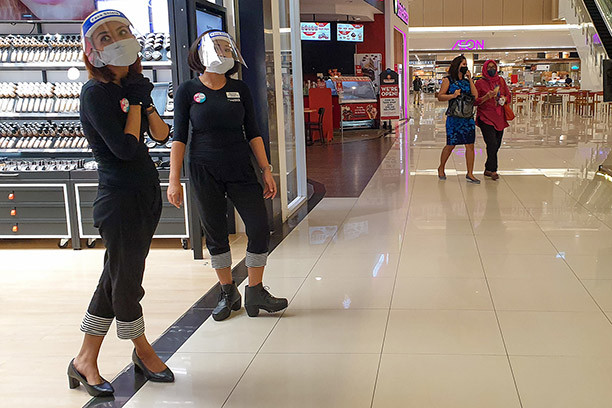100,000 retail workers on brink of furlough as spending free-falls
Change Size

M
ore than 100,000 workers in the retail industry face the risk of being furloughed as customers have been visiting rarely and spending little during the COVID-19 pandemic, associations have said.
An internal survey by the Indonesian Shopping Center Tenants Association (Hippindo) revealed that retail sales from May to July were down about 80 percent from the pre-pandemic level. The association projected that lifestyle retailers would also post a 60 percent year-on-year (yoy) contraction in the third quarter.
“Our current data [from 90 companies] show that around 100,000 employees may be furloughed,” Hippindo chairman Budihardjo Iduansjah told reporters during an online press conference on Monday.
In addition to the furloughed employees, around 1.5 million workers could face other financial perils, such as pay cuts and shift reduction if the pandemic continues to suppress shopping center visits and revenue, it said.
The pandemic has brought the retail sector to its knees amid movement restrictions, weakening purchasing power and customers’ preference to stay at home to avoid catching the coronavirus.
Household spending, which accounts for more than half of Indonesia’s gross domestic product (GDP), fell 5.51 percent yoy in the second quarter, which compares to annual growth of 5.18 percent in the same period last year, according to Statistics Indonesia (BPS).
A recent Bank Indonesia (BI) survey showed that retail sales fell 12.3 percent yoy in July, a smaller drop than the 17.1 percent contraction in June. The central bank’s survey projected retail sales in August to be down 10.1 percent from the same month last year.
Indonesian Shopping Center Association (APPBI) chairman Alphonzus Widjaja put the blame on rising COVID-19 infections and Jakarta’s renewed large-scale social restrictions (PSBB) for discouraging consumers from visiting shopping centers. He asked the central government and regional administrations to provide incentives and relax taxes for the industry.
“The government needs to provide a direct stimulus for shopping centers. We were able to survive during the last couple of months, but it’s now getting extremely difficult for us, as the number of visitors has dropped to only 10 percent of the capacity,” he said.
Both the APPBI and Hippindo requested waivers for various taxes, including income tax, billboard tax and land and building tax, as well as an electricity subsidy. Furthermore, retailers also asked the government to chip in for retail worker’s wages to help lower operational costs and prevent massive layoffs.
“The government has provided a wage subsidy, but it works more like a cash transfer. We propose the government pay 50 percent of employees’ wages,” Alphonzus said.
The government has provided Rp 600,000 (US$40.33) in monthly cash transfers for four months for some 15.7 million workers earning less than Rp 5 million under its wage subsidy program. It has allocated Rp 37.7 trillion from the state budget for the program.
While the program could help boost consumer spending, Institute for Development of Economics and Finance (Indef) economist Andry Satrio Nugroho told The Jakarta Post that it did not address industry’s operational expense plight.
“To help the retail industry push down its costs, the government can ‘co-fund’ employee wages to help the private sector,” he said in a separate interview on Monday.
Andry said both the government and retailers should brace for a prolonged economic downturn, as the rising COVID-19 infections made the general population cautious about spending due to fear over economic uncertainty.
“We project that Indonesia’s GDP contraction will remain until the first quarter of 2021. The people are still refraining from returning to their usual consumption, as the COVID-19 problem remains unresolved,” he said.
Fitch Solution projects that household spending in Indonesia will contract by 1.8 percent yoy, more than during the 2008 financial crisis, as Jakarta has gone back into PSBB to curb the spread of the coronavirus.
The rating agency also expects Indonesia’s economy to contract by 1.3 percent this year, while the unemployment rate is projected to increase to 9.5 percent from around 5.2 percent in 2019.
Andry said the government should focus on rooting out the main problem of the rising COVID-19 infections to expedite the recovery, as fear of infection had created a sense of uncertainty that suppressed consumer spending.
“If we give the public additional income without taking care of the pandemic, people would hoard their cash rather than spend it,” he stressed. “Once the health crisis is over, the economy will follow suit.”









